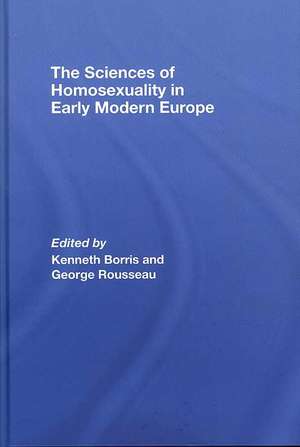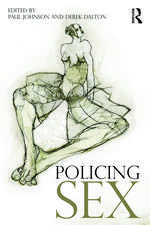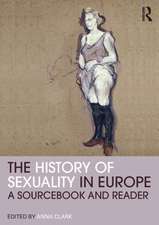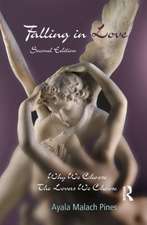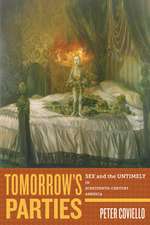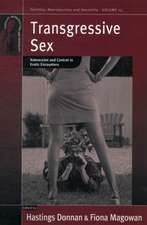The Sciences of Homosexuality in Early Modern Europe
Editat de Kenneth Borris, George S. Rousseauen Limba Engleză Hardback – 30 noi 2007
This collection establishes that efforts to produce scientific explanations for same-sex desires and sexual behaviours are not a modern invention, but have long been characteristic of European thought. The sciences of antiquity had posited various types of same-sexual affinities rooted in singular natures. These concepts were renewed, elaborated, and reassessed from the late medieval scientific revival to the early Enlightenment. The deviance of such persons seemed outwardly inscribed upon their bodies, documented in treatises and case studies. It was attributed to diverse inborn causes such as distinctive anatomies or physiologies, and embryological, astrological, or temperamental factors.
This original book freshly illuminates many of the questions that are current today about the nature of homosexual activity and reveals how the early modern period and its scientific interpretations of same-sex relationships are fundamental to understanding the conceptual development of contemporary sexuality.
| Toate formatele și edițiile | Preț | Express |
|---|---|---|
| Paperback (1) | 414.70 lei 6-8 săpt. | |
| Taylor & Francis – 30 noi 2007 | 414.70 lei 6-8 săpt. | |
| Hardback (1) | 824.53 lei 6-8 săpt. | |
| Taylor & Francis – 30 noi 2007 | 824.53 lei 6-8 săpt. |
Preț: 824.53 lei
Preț vechi: 1180.87 lei
-30% Nou
Puncte Express: 1237
Preț estimativ în valută:
157.77€ • 171.92$ • 132.95£
157.77€ • 171.92$ • 132.95£
Carte tipărită la comandă
Livrare economică 23 aprilie-07 mai
Preluare comenzi: 021 569.72.76
Specificații
ISBN-13: 9780415403214
ISBN-10: 0415403219
Pagini: 296
Ilustrații: 26 b/w images and 26 halftones
Dimensiuni: 156 x 234 x 22 mm
Greutate: 0.71 kg
Ediția:1
Editura: Taylor & Francis
Colecția Routledge
Locul publicării:Oxford, United Kingdom
ISBN-10: 0415403219
Pagini: 296
Ilustrații: 26 b/w images and 26 halftones
Dimensiuni: 156 x 234 x 22 mm
Greutate: 0.71 kg
Ediția:1
Editura: Taylor & Francis
Colecția Routledge
Locul publicării:Oxford, United Kingdom
Public țintă
Postgraduate and ProfessionalCuprins
1. Introduction: The Prehistory of Homosexuality in the Early Modern Sciences Kenneth Borris Part 1: Medicine 2. Disorder of Body, Mind or Soul: Male Sexual Deviance in Jacques Despars’s 'Commentary on Avicenna' Derek Neal 3. Giulio Guastavini’s Commentary on Pseudo-Aristotle’s Account of Male Same-Sexual Coitus, 'Problemata 4.26' Faith Wallis 4. Policing the Anus: Stuprum and Sodomy According to Paolo Zacchia’s 'Forensic Medicine' George Rousseau 5. Syphilis and the Silencing of Sodomy in Juan Calvo’s 'Tratado del Morbo Gálico' Cristian Berco 6. The Strange Medical Silence on Same-Sex Transmission of the Pox, c.1660–c.1760 Kevin Siena Part 2: Divinatory, Speculative and other Sciences 7. Sodomizing Science: Cocles, Patricio Tricasso, and the Constitutional Morphologies of Renaissance Male Same-Sex Lovers Kenneth Borris 8. Representations of Same-Sex Love in Early Modern Astrology P.G. Maxwell-Stuart 9. Astrological Conditioning of Same-Sexual Relations in Girolamo Cardano’s Theoretical Treatises and Celebrity Genitures H. Darrel Rutkin 10. 'Bolognan Boys are Beautiful, Tasteful, and Mostly Fine Musicians': Cardano on Male Same-Sex Love and Music Guido Giglioni 11. Mercury Falling: Gender Flexibility and Eroticism in Popular Alchemy Allison B. Kavey Part 3: Science and Sapphisms 12. Intrigues of Hermaphrodites and the Intercourse of Science with Erotica Winfried Schleiner 13. Erotics versus Sexualities: Current Science and Reading Early Modern Female Same-Sex Relations Harriette Andreadis
Descriere
This collection establishes that efforts to produce scientific explanations for same-sex desires and sexual behaviors are not a modern invention, but have long been characteristic of European thought.
This original book freshly illuminates many of the questions that are current today about the nature of homosexual activity and reveals how the early modern period and its scientific interpretations of same-sex relationships are fundamental to understanding the conceptual development of contemporary sexuality.
